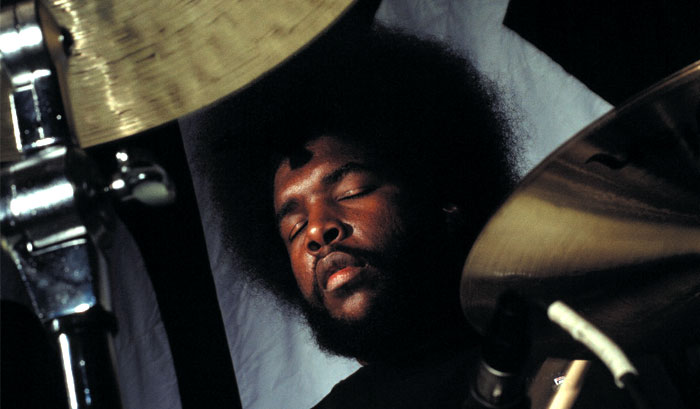


Drummer/producer Ahmir Thompson is a living link between the digital science of modern hip-hop and the flesh-and-blood textures of vintage R&B. He co-founded the Roots, universally hailed as one of the most sonically inventive hip-hop acts. Meanwhile, his collaborations with such artists as D'Angelo, Erykah Badu, and Common have reasserted the importance of realtime playing in a style dominated by sampling and programming.
"I'm really into the game of making people guess, is it a machine, or is it him?" says Thompson, who also goes by the name ?uestlove (pronounced "Questlove"). One famous example is the Roots' biggest hit, "You Got Me," which sounds for all the world like a programmed sidestick pattern-until Thompson cuts loose with a blazing drum-and-bass groove. Like much of Thompson's work, the passage is startling, witty, and funky.
"Hip-hop is based in rhythm, repetition, and perfect time," says Thompson. "With Roots stuff, I go for a more perfect, quantized-type sound than I would with, say, Erykah or D'Angelo. For D'Angelo's Voodoo, we wanted to play as perfectly as we could, but then deliberately insert the little glitch that makes it sound messed up. The idea was to sound disciplined, but with a total human feel."
For Thompson, "human feel" is bred in the bone. His father was the leader of the '50s doo-wop group Lee Andrews and the Hearts, and Ahmir literally grew up onstage. "My whole family was involved playing the oldies circuit with groups like the Coasters, the Drifters, the Chiffons," he says. "I was playing percussion at gigs from the age of seven because my parents didn't believe in babysitters. By 13, I was the musical director, and I stayed in that world until I got a record deal with the Roots at age 22."
But Thompson is quick to point out that he is no realtime purist: "In actuality, one of the biggest influences on my drumming is a producer and drum programmer named Jaydee, from the group Slum Village. He makes programmed stuff so real, you really can't tell it's programmed. He might program 128 bars, with absolutely no looping or quantizing. When Q-Tip from A Tribe Called Quest first played me some of his stuff, I said, 'The drums are messed up! The time is wrong!' And when we did a song for D'Angelo's record that Lenny Kravitz was supposed to play on, Lenny said, 'I can't play with this-there's a discrepancy in the drum pattern.' And we're like, 'It's supposed to be this way!'"
Thompson relies on several Yamaha kits: a new Maple Custom Absolute, several sets from the early '80s, and the Stage Custom he used with D'Angelo. But Thompson's tireless studio experimentation is as crucial to his drum sounds as the instruments themselves. "I like to mold sounds like clay," he says. "Sometimes I put drums through a guitar amp. Or we might put mikes everywhere-in the room, down the hall, anyplace you might hear the drums. Sometimes we use just the farthest mikes, EQ them until they sound dirty enough, mix it all to one track, really compress it, and then bounce it to another track. We'd go around that cycle a few times-six generations, maybe."
Thompson is currently at work on the Roots' sixth album, ironically titled Introducing the Roots. To hear Thompson tell it, the disc is an outgrowth of the joys and frustrations of trying to create deep music in a shallow cultural climate: "Our aesthetics are from the long-gone era of the '50s, '60s, and '70s, but we're trying to cater to the fast food, just-add-water audience of today. But the way we see it, there are two paths to longevity: you can switch your style to cater to the times, or take the longer art road where you set high standards and follow them. You have to push the envelope all the time, and in order to do so, you have to constantly be learning."
























